Edie Melson's Blog, page 56
April 3, 2024
What Does a Writer Do After She's Met Her Deadline?

by Lynn H. Blackburn @LynnHBlackburn
I recently survived my 13th writing deadline.
You might think that would mean I was prepared for the aftermath.
You would be wrong.
Even though I should have known what was coming, it still took me several days to process my emotions and behaviors and trust that I would be okay. Why?
I have a theory.
You’ve heard people talk about writing books being similar to pregnancy. Well, I’ve had three children and there are many things that I’ve apparently blocked out. Some people say we don’t remember all the details of delivery because if we did, we’d never do it again. That our minds protect us from the memories so we’ll continue to procreate.
I don’t know if that’s true or not, but it feels true.
And it’s true for the hours, days, and weeks immediately following the completion of a novel as well.
So for my benefit next year when I am in this exact same spot, and because I think you have a right to know what you’re getting into, I’ve made a few notes about what happens to me post-deadline.
As always, your mileage may vary. This is descriptive, not prescriptive. But if you resonate with any of these things, know that you’re not alone.
**Also, a reminder for the writers who see a bunch of numbers below and panic. It goes like this - Hours:Minutes:Seconds**
Deadline00:00:00 Hit send.
00:00:01 Stare at screen.
00:00:03 Consider recalling the email.
00:00:05 Remember that the book is due, and there’s nothing more to be done until your editor decides that you’re either the worst author ever or possibly a genius, but probably somewhere in between.
00:00:10 Close eyes. Bow head. Thank God it’s over. Ask Him to make something of the mess you’ve made of this story. Pray for your editor to be gentle and have had plenty of coffee the day she reads it.
00:01:00 Wonder what to do next. Body says, “Go to bed, you moron. I’m exhausted.” Brain says, “Do you have any idea how many things you still have to do?” Emotional center says, “I’m so happy! I’m so scared! I’m so excited! I’m so … everything. All at once.” Brain says, “You can’t be all those things at once.” Emotional center says, “Wanna bet?” Body says, “For the love, put me to bed.”
00:05:00 Promise yourself that tomorrow you will relax. You will unwind. You will chill.
00:59:00 Finally get in bed. Exhaustion takes over. Sleep is weird. Dreams are a combination of Doctor Who, NCIS, and Pride and Prejudice.
Day after Deadline00:01:00 - Try not to think about plot holes. Try to be happy because you did it! You turned in a book!
00:02:00 - Wonder why you aren’t happy.
00:03:00 - Try to read a book, because books make you happy. Read three pages. Stop. Still not happy.
00:04:00 - Panic. Can’t read. Can’t relax. There is no chill happening.
02:00:00 - Give up on relaxation and make a list of all the things you didn’t do in the 6-8 weeks leading up to the deadline. Panic. Start laundry. Clean out the fridge.
03:00:00 - Remember you’re supposed to be relaxing. Try again.
04:00:00 - Wander around the house. Consider hopping a plane to anywhere. Remember that you’re a writer and you can’t afford to do that.
05:00:00 - Look at the list again. Process crushing guilt about how much you didn’t do over the past few months. Eat chocolate.
06:00:00 - Text writer friends with variations on the theme of, “I think there’s something wrong with me.”
06:02:00 - Writer friends respond with variations on the theme of, “You do this every.single.time and we love you. Breathe. You’ll be fine.”
06:03:00 - Stare at phone in shock. They’re right. This has happened before. You aren’t losing it. You’re normal. Okay, no, you aren’t normal. But that’s okay because you never were.
06:04:00 - Give yourself grace. Breathe.
06:05:00 - Finally remember that after a deadline, words don’t work. Find creative outlets that require no words. Crochet. Cook. Play a game. Stop yourself from doing a crossword puzzle because, again, words don’t work. Do a sudoku instead.
12:00:00 Decide to write a blog post, when you can use words again, about this experience because as the day has gone on, you’ve remembered that this happens every time.
15:00:00 Go to bed at a decent hour for the first time in weeks. Have weird dreams.
Second Day after Deadline06:00:00 - Wander around. Lie on the floor and stare at the ceiling fan. Eat chocolate.
12:00:00 - Decide that your ability to relax has been permanently broken.
14:00:00 - Try to read again. Nope. Too soon.
15:00:00 - Sleep. Weird dreams continue.
Third Day after Deadline06:00:00 - Realize that your brain is finally slowing down. Succeed in chilling out for a while.
09:00:00 - Spend a few hours not chilling because really, have you *seen* the list of stuff you need to do?
15:00:00 - Sleep.
Fourth Day after Deadline06:00:00 - Huh. So, it takes a solid three days to calm down and re-sync my body, brain, and emotions. Wow. Seems like I should have remembered this.
Grace and peace,Lynn
TWEETABLEWhat Does a Writer Do After She's Met Her Deadline? from @LynnHBlackburn on @EdieMelson (Click to Tweet)
 Lynn H. Blackburn is the award-winning author of Unknown Threat, Malicious Intent, and Under Fire, as well as the Dive Team Investigations series. She loves writing swoon-worthy southern suspense because her childhood fantasy was to become a spy, but her grown-up reality is that she's a huge chicken and would have been caught on her first mission. She prefers to live vicariously through her characters by putting them into terrifying situations while she's sitting at home in her pajamas! She lives in Simpsonville, South Carolina, with her true love, Brian, and their three children. Learn more at www.lynnhblackburn.com.
Lynn H. Blackburn is the award-winning author of Unknown Threat, Malicious Intent, and Under Fire, as well as the Dive Team Investigations series. She loves writing swoon-worthy southern suspense because her childhood fantasy was to become a spy, but her grown-up reality is that she's a huge chicken and would have been caught on her first mission. She prefers to live vicariously through her characters by putting them into terrifying situations while she's sitting at home in her pajamas! She lives in Simpsonville, South Carolina, with her true love, Brian, and their three children. Learn more at www.lynnhblackburn.com.
Published on April 03, 2024 22:00
April 2, 2024
Set Your INTENTION to Achieve Your Goals as a Writer

by Sarah Sally Hamer @SarahSallyHamer
We’ve all been told about setting goals. Which is a great exercise! Yes, we should know what we want. But all too often, we fail in achieving those goals. So, today, we’re going to see if we can tweak our world a little bit and come at the problem from another direction.
Most of us create goals that are completely unattainable.
We have grandiose ideas of how much we can do in a day or what a goal takes. We even think we want one thing, when it’s actually something else that’s important and we just can’t make things happen. And then we beat ourselves to a pulp, feeling like we just aren’t good enough. Right? Does that sound familiar?
If you actually do set goals and achieve them in a reasonable time, congratulations! You are probably 2% of the world’s population. Keep doing what you’re doing.
But if you’re in that other 98%, you may be struggling.
Let’s start with the goal itself.
Here are some tips for setting goals:Make them achievable. Setting a goal should be within your reach – can you make it happen? Are you expecting too much of yourself?Setting smaller goals that lead to much larger ones are like taking college courses you may not be really interested in but which lead to a degree. Sometimes you have to lay that foundation before you can get what you really want.Make them logical. Do you believe you can do it?Be open to possibilities: Not THAT particular house, but a house like it. Use positive ideas: What you DO want, not what you DON’T wantBe willing to adapt: You can make different choices as you goCreate wonderful things! You are meant to be happy!
Once you’ve decided on a logical, reasonable, achievable goal, now is the time to set the intention.
An intention is what you will do to make the goal come to fruition.
If your goal is to publish a book, for instance, you would first need to write one. Most people will never get that far. So, we’ll focus on the writing first. I’m not going to go through the dozens of steps this can include, since every one of us is completely different in the ways we create books.
Some Suggestions
Come up with ideas. They come from everywhere and most writerly folks I talk to already have dozens and dozens.
Do research for genre and target markets. Find out where your story can fit so it’s easier to sell.
Read. Read. Read. Read in your genre. Read outside your genre. Read books you love and books you hate. The more you know what is and is not selling and the reasons successful books are successful, the more chances you have to sell yours.
Take classes. Read craft books. Join a writing group (Be wary! But there are plenty to choose from.) Talk to writer friends. You’re not alone!
Research the business. The more you know about how publishing works, the more chances you’ll have of publishing.
These intentions, actual physical things you can do to reach your goal, can raise your chances of getting published exponentially. And none of them are hard. They do take time and effort but are very worth it.
Bottom line:Goals are amazing tools. But just setting a goal isn’t, by itself, probably won’t get you where you want to go. Take the time to really determine what you intend to do. Create a path to get there. And, become one of the 2% of folks who achieve them.
What are your intentions?
TWEETABLESet Your INTENTION to Achieve Your Goals as a Writer from @SarahSallyHamer on @EdieMelson (Click to Tweet)
 Sarah (Sally) Hamer, B.S., MLA, is a lover of books, a teacher of writers, and a believer in a good story. Most of all, she is eternally fascinated by people and how they 'tick'. She’s passionate about helping people tell their own stories and has won awards at both local and national levels, including two Golden Heart finals.
Sarah (Sally) Hamer, B.S., MLA, is a lover of books, a teacher of writers, and a believer in a good story. Most of all, she is eternally fascinated by people and how they 'tick'. She’s passionate about helping people tell their own stories and has won awards at both local and national levels, including two Golden Heart finals.A teacher of memoir, beginning and advanced creative fiction writing, and screenwriting at Louisiana State University in Shreveport for over twenty years, she also teaches online for Margie Lawson at www.margielawson.com. Sally is a free-lance editor and book coach, with many of her students and clients becoming successful, award-winning authors.
You can find her at info@mindpotential.org
From Sally: I wish to express gratitude to the giants upon whose shoulders I stand and who taught me so much about the writing craft. I would list every one, if it were only possible.
Published on April 02, 2024 22:00
April 1, 2024
Unexpected Tips about Writing the Last Chapter of Your Book

by PeggySue Wells @PeggySueWells
The last chapter of your book is not the last word. Will the reader close this book and immediately look for the next by the same author?
While the first chapter entices the reader to read the rest of the book, the last chapter sells your next book.
The Last Chapter
Reading over the conclusion of your manuscript, make certain these points were covered. Pace the ending to feel natural and not rushed.Craft a satisfying ending that connects back to the beginning. Surprise the reader with how the details of the story come together.Tie up all the loose ends.
Pace The End
Know when to end the manuscript. “Cut the final chapter short, tie the loose ends in a bow, but don’t go a day over,” said Waterbrook editor Estee Zandee. “End at midnight the night before but don’t show the characters brushing their teeth the next morning of their new life after the story ended.”
Craft the final chapter to match the pace of the rest of the book. And they all lived happily ever after quickly penned is the opposite of a satisfying ending. Show how events impacted the characters and how they are different than they were in the beginning.
The final chapter in nonfiction gives the reader a vision of what is possible. The promise is that by applying in their own life what they learned in this title, their goals and dreams are within reach.
Connect To The Beginning
Stick the landing in the final chapter. Beginning in chapter one, you established a concept. In the final pages, round out the concept and make the points crystal clear.
For fiction, use the last chapter to give a nod to the beginning. Remind the reader where the story began and how far the reader has traveled with the author.
Nonfiction focuses on a topic with a unique slant. Wrap up the manuscript with a summary of the important points that reinforced that slant.
Surprise The Reader
In a fiction series, there may be unanswered questions that encourage the reader to reach for the next book but make certain the story concludes with enough immediate resolution to satisfy the closing of this section of the journey.Each book in JK Rowling’s Harry Potter series was a complete adventure. Yet, the overarching and more complicated plot resolved in the seventh book.Lydia Sherrer’s urban fantasy series Love, Lies, and Hocus Pocus provides a complete event in each novel but the greater story resolves when the series is finalized.Jan Karon’s At Home In Mitford series is 14 books. Each can stand alone yet read as a whole the collection gives an encompassing view of the life of Father Timothy Kavanagh and the people who populate the community of Mitford.Louis L’Amour’s Sackett series similarly gives a full story in each book, while the action-packed history of the Sackett family emerges throughout 19 books.
Readers are delightfully surprised to discover unexpected connections between characters and events as the series continues.
Tie Up Loose Ends
A strong ending is similar to a benediction. Jesus used fiction and nonfiction to inspire people to live better. Go and sin no more, do not worry, whatever you ask in prayer, believe that you have received it and it will be yours, and if you do not forgive others their trespasses, neither will your Father forgive your trespasses were some of the themes Jesus shared.
While no one likes to be preached at, a book’s final chapter is similar to a benediction. Through fictional examples or nonfiction insights, the last words of a manuscript can inspire readers to make different choices and live better.
Whether your book is fiction or nonfiction, a series or a standalone, a well-written final chapter leaves the reader wanting more from the author.
The Last Word
After ending the fiction story, when possible include an exciting sneak-peak from the next book to come or from one of your already published books. The message to the reader is that there is more excellent material available from this author, here is a sample, and here is where to find it.
“I just found my new favorite author,” a reader wrote in their review of a Charles Martin book. With two short fiction series and some 18 standalones, one of Martin’s strengths is his ability to end each project so well the reader quickly looks for another.
Rather than the last word, the final chapter is the springboard to the author’s next book.
TWEETABLEUnexpected Tips about Writing the Last Chapter of Your Book from @PeggySueWells on @EdieMelson (Click to Tweet)
 PeggySue Wells is the bestselling author of 40 books and collaborator of many more. Action and adventure, romantic suspense, military romance, and cozy mystery are the page-turning novels by P.S. Wells, including Homeless for the Holidays, Chasing Sunrise, The Patent, and Unnatural Cause. How to live better, easier, and simpler is the focus of her nonfiction including The Ten Best Decisions A Single Mom Can Make. Founder of SingleMomCircle.com, PeggySue coaches writing and speaks at events and conferences. When not writing, she parasails, skydives, snorkels, scuba dives, rides horses, and has taken (but not passed) pilot training. Connect with her at www.PeggySueWells.com, on Facebook at PeggySue Wells, and LinkedIn at linkedin.com/in/peggysuewells
PeggySue Wells is the bestselling author of 40 books and collaborator of many more. Action and adventure, romantic suspense, military romance, and cozy mystery are the page-turning novels by P.S. Wells, including Homeless for the Holidays, Chasing Sunrise, The Patent, and Unnatural Cause. How to live better, easier, and simpler is the focus of her nonfiction including The Ten Best Decisions A Single Mom Can Make. Founder of SingleMomCircle.com, PeggySue coaches writing and speaks at events and conferences. When not writing, she parasails, skydives, snorkels, scuba dives, rides horses, and has taken (but not passed) pilot training. Connect with her at www.PeggySueWells.com, on Facebook at PeggySue Wells, and LinkedIn at linkedin.com/in/peggysuewells
Published on April 01, 2024 22:00
March 31, 2024
Develop a Healthy Perspective on Writing Contests

by Edie Melson @EdieMelson
It's that time of year again—writing conference season. With all the excitement of attending a conference also comes an attack of nerves for those who entered contests. Contests are fun and bring a lot of benefits, but they can also derail our progress if we give them too much power.
We've notified the finalists in the Selah Awards for the Blue Ridge Mountains Christian Writers Conference, so writing contests are on my mind. Over the past few weeks I’ve done everything from congratulate to commiserate with writers who entered, and it’s made me consider how I view contests—and how I should view contests.It’s easy for me to be unbiased when it comes to this particular contest because I’m not allowed to enter it. My co-director, Edwina Perkins and I, along with contest director, Eva Marie Everson, set the contest up that way on purpose to protect the integrity of the judging.Before you jump to any conclusions, NO Edwina and I don’t have anything to do with the judging for this contest. We really don’t have much to do with the contest at all. We leave that up to the amazing Eva Marie Everson. She does a fantastic job, including protecting this contest with the ferociousness of a she-wolf defending her young. And to be clear, she doesn’t do any of the judging either. She pulls in readers to give their honest opinions about the books entered. We don’t allow editors or agents or anyone else with connections to specific parts of the industry take part in the judging.
But readers are fickle—and opinionated. What one likes, another dislikes. And that is what’s at the heart of this post. Entering a writing contest isn’t like solving a math problem for the right answer, it’s subjective and unpredictable.
Enter the Not-So-GoodFact 1: Good books don’t always win. Sometimes they don’t even make the finalist list.
Fact 2: What we may consider as “poor books” sometimes make the finalist list, and they sometimes win.
Conclusion: Writing contests aren’t FAIR.
Now the TruthWriting contests aren’t fair. Yep I said it—and I’ll go one step further. Very little about the publishing world is fair. It’s a subjective industry full of unpredictable people. But just because a contest isn’t fair, doesn’t mean it doesn’t have value.
Let’s look at the concept of fairness. It’s something we learned about in Kindergarten and while it had purpose there, it pretty much skewed our perception of how things should be.
Truthfully, life isn’t fair.
So why enter a contest if it’s not going to give us a fair shot? But that’s another misconception. Contests really do give authors a pretty fair shot. We do everything we can to limit the biases and equal the playing field. But we’re part of a subjective industry, so the end results don’t always appear fair.
Look beyond winning and losing to find the value in entering writing contests.
Onto the GoodValue #1: Experience submitting your work without knowing the outcome. It’s good practice for submitting our work for publication.
Value #2: Visibility. Even if we don’t win, there are judges who see our work. Many contracts have come from a judge seeing a writer’s work—whether it won or not.
Value #3: The possibility of winning.
Acknowledging Frustrating EmotionsEntering a writing contest does engage our emotions, no matter how much we try to keep it from happening. There’s nothing wrong with getting excited when we win, or sad when we don’t. The important thing is to keep our perspective. Winning or not winning a contest won’t make or break us. Publishing is a journey. It has highs and lows, as well as easy times and difficult ones.
Publishing is also a career and/or ministry choice for many of us. When that’s the case, we need to remain professional in all our dealings. Calling out a contest and labeling it as unfair won’t change the system, but it will make us look petty and unprofessional. Rubbing a win in the faces of others has the same negative impact on our publishing goals.
Bottom LineGo ahead a take a chance and enter the contests that appeal to you. Increase the odds by following the directions exactly and make sure the contest you’re entering is a good fit for the writing you’ve done. Then sit back and enjoy the ride. Sometimes you win, sometimes you don’t, but good will come out of the experience, no matter what.
These are my thoughts on entering contests. I’d love to know yours. Be sure to leave a comment in the section below.
And don’t forget to join the conversation!Blessings, Edie
TWEETABLEDevelop a Healthy Perspective on Writing Contests from @EdieMelson (Click to Tweet)
 Edie Melson is a woman of faith with ink-stained fingers observing life through the lens of her camera. No matter whether she’s talking to writers, entrepreneurs, or readers, her first advice is always “Find your voice, live your story.” As an author, blogger, and speaker she’s encouraged and challenged audiences across the country and around the world. Her numerous books reflect her passion to help others develop the strength of their God-given gifts and apply them to their lives. Connect with her on her website, through Facebook, Twitter and Instagram.
Edie Melson is a woman of faith with ink-stained fingers observing life through the lens of her camera. No matter whether she’s talking to writers, entrepreneurs, or readers, her first advice is always “Find your voice, live your story.” As an author, blogger, and speaker she’s encouraged and challenged audiences across the country and around the world. Her numerous books reflect her passion to help others develop the strength of their God-given gifts and apply them to their lives. Connect with her on her website, through Facebook, Twitter and Instagram.
Published on March 31, 2024 22:00
March 30, 2024
Are We Carrying the Aroma of Christ?
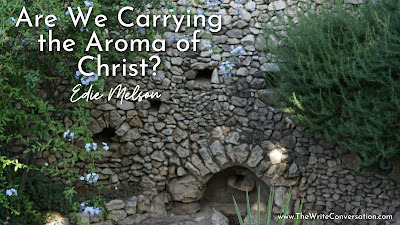
by Edie Melson @EdieMelson
But thanks be to God, who always leads us in triumph in Christ, and manifests through us the sweet aroma of the knowledge of Him in every place. 2 Corinthians 2:14
Travel back in time with me as we watch Joseph and Nicodemus take the body of Jesus from the cross that fateful Friday and prepare it for burial. It must have taken valuable time to convince Pilate to let them have Him, but they managed. Nicodemus carried seventy five pounds of myrrh and spices to prepare the body. It was an offering worthy of a king—a dead king.
Imagine the tears they shed as they silently and gently lowered his broken body to the ground. See the abuse He suffered at the hands of his accusers. The beatings rendered Him almost unrecognizable as the blood and filth poured from His body. Still they loved Him so much.
Time was running out before the Sabbath began. They didn’t have time to prepare His body like they wanted, like He deserved. But at least there was an unused tomb in the garden close by. They took Him there and lovingly prepared His body.
They tried to cover the stench of death with herbs and linen, but can you imagine the odor inside that dark, cramped tomb. The sickly sweet smell of myrrh combining with the overwhelming smell of blood and torture. As they worked, the smell must have seeped into their noses, hair and clothing, and when they left they took with them the odor of despair as they gathered with the others to celebrate an empty Sabbath.
Move ahead to Sunday morning, that very first Easter. Mary Magdalene has returned with the news that someone has stolen Jesus’ body. As the disciples race to the tomb a part of them must dread what they’ll find. But as John enters that resting place of the dead something besides Jesus’ body is missing.
In a place once redolent with the stink of death, there lies only the empty grave clothes and spices. Imagine the odor now—this place of death now carries the aroma of life.
Jesus led the way—He replaced the odor of death with the aroma of life. Now it’s up to us to let Him lead others down the same path through us.
The question is, does our life carry the stink of death or the fragrance of life everlasting?
TWEETABLEAre We Carrying the Aroma of Christ? from @EdieMelson (Click to Tweet)
 Edie Melson is a woman of faith with ink-stained fingers observing life through the lens of her camera. No matter whether she’s talking to writers, entrepreneurs, or readers, her first advice is always “Find your voice, live your story.” As an author, blogger, and speaker she’s encouraged and challenged audiences across the country and around the world. Her numerous books reflect her passion to help others develop the strength of their God-given gifts and apply them to their lives.Connect with her on her website, through Facebook, Twitter and on Instagram.
Edie Melson is a woman of faith with ink-stained fingers observing life through the lens of her camera. No matter whether she’s talking to writers, entrepreneurs, or readers, her first advice is always “Find your voice, live your story.” As an author, blogger, and speaker she’s encouraged and challenged audiences across the country and around the world. Her numerous books reflect her passion to help others develop the strength of their God-given gifts and apply them to their lives.Connect with her on her website, through Facebook, Twitter and on Instagram.
Published on March 30, 2024 22:00
March 29, 2024
Is social media a wise investment for Writers?
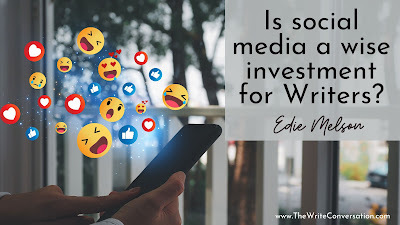
by Edie Melson @EdieMelson
The short answer?
It depends on our reason for being online.
Social media. Often just the mention of this subject conjures up hours of time. First there’s the time it takes to hang out online, then the time it takes to figure out what to say, who to LIKE and which updates to read, comment on, and share.
Is there a chance that someone out there in cyberspace might actually—either now or sometime in the future—read what I’ve written and been impacted by it?
There has been a lot of discussion—ironically taking place ON social media—about whether social media is still a valuable endeavor for writers.
The truth is this: Social media is hard work. It takes being intentional and keeping your goals in mind.
And those goals are what can get us in trouble.
I think most people approach social media with the wrong goal in mind and that leads to frustration.
First, I want to emphasize that each person’s writing journey is unique. Because of that, we’re each going to gather different tools, and find the ones that work best for us.
But I do believe social media can be a valuable tool for most writers.
My 2 Bottom-line Reasons for Continuing to Participate in Social Media
1. Personally, I believe social media is an extension of the writing ministry God has given. My primary reason for being on social media is to serve others and to build connections.
2. I believe God has called me to be a light in the dark. So the darker social media gets the stronger my call to stay there.
Social Media Benefits for MeI get a chance to serve and encourage my audience. I can post updates that provide valuable information and encouragement without asking for something in return. This builds trust and lays the groundwork that encourages them to search for me in other places (like bookstores).It gives me a place to connect with others who have similar interests. I have opportunities to interact with other writers. These interactions include: encouragement from others and toward others valuable leads on opportunitiesopportunities to share and receive information about some aspect of writingIt gives me opportunities to share the message(s) of my heart. I can do this through invitations to post on blogs, become a guest on podcasts, and in many other ways.
What social media does not do for me
Social media doesn't sell my books consistently or support my ministry financially. There isn’t (nor has there ever been, as far as I can tell) a direct connection between advertising a product or service on social media and selling it. It’s not possible to quantify the percentages sales based on who sees a social media update.
Why doesn’t social media work for sales?Most people are on social media to be social. Sometimes they are looking for information, but in general, they’re just at hanging out.An invitation to buy something is seen as an interruption. I don’t know about you, but I get irritated by the paid advertising slipped into my browsing pleasure. The algorithms for most networks make it difficult to get visibility when someone selling something. Social media networks want to please their users and deliver the experiences they enjoy. Since most people are irritated by advertising, these networks try to limit anything that could be seen as a negative experience.
Bottom LineIf a writer is on social media solely to sell, then it’s going to be difficult to find value in being there.
However, if you’re looking to make connections and increase your ability to serve your audience—as well as the other benefits mentioned above—I believe you will also find value in staying active on social media.
TWEETABLEIs social media a wise investment for Writers? from @EdieMelson (Click to Tweet)
 Edie Melson is a woman of faith with ink-stained fingers observing life through the lens of her camera. No matter whether she’s talking to writers, entrepreneurs, or readers, her first advice is always “Find your voice, live your story.” As an author, blogger, and speaker she’s encouraged and challenged audiences across the country and around the world. Her numerous books reflect her passion to help others develop the strength of their God-given gifts and apply them to their lives.Connect with her on her website, through Facebook, Twitter and on Instagram.
Edie Melson is a woman of faith with ink-stained fingers observing life through the lens of her camera. No matter whether she’s talking to writers, entrepreneurs, or readers, her first advice is always “Find your voice, live your story.” As an author, blogger, and speaker she’s encouraged and challenged audiences across the country and around the world. Her numerous books reflect her passion to help others develop the strength of their God-given gifts and apply them to their lives.Connect with her on her website, through Facebook, Twitter and on Instagram.
Published on March 29, 2024 22:00
March 28, 2024
Have You Considered the Hands of Jesus?

by Edie Melson @EdieMelson
In this season of Easter, my thoughts and imaginings have turned to hands. Of course you know what started me down that path. The image of Jesus’ nail-scarred palms are everywhere. But as I reflect on those precious hands, I realize the story of our Savior’s hands begin much earlier.
I believe we see the power of His hands as He stretched them over the formless void and spoke creation into existence. We saw them as He tenderly shaped His children—man and woman—made perfectly in His own image. Then, with heart-breaking clarity, in my mind’s eye, I can see those powerful hands when they performed the first sacrifice as he provided a covering for His sinful children.
As the centuries progressed, we saw that God sometimes worked through the hands of men like Noah. God used Him to preserve a remnant of humanity when creation went so wrong. In Moses, I saw the power of God when His prophet stretched forth his hands and parted the Red Sea, providing for the salvation of His people. He was there as Joshua defeated Jericho and with Gideon as he discovered his own part in God’s plan. We saw the fingerprints of God working throughout the Old Testament—from Elijah to Elisha, Job to Josiah. He was always present— rebuilding, refining, remonstrating and renewing those He loves.
Then it happened. God’s Spirit descended and touched a young girl and Mary was with child—destined to give birth to the Son of God. As her time drew near, we saw how God’s loving hands worked through Joseph as he protected his wife, delivered his infant son, and cared for them.
When Jesus began His time of ministry, we once more saw the work of God’s hands. He was everywhere. He touched the untouchables and encouraged a dark world to refocus on God’s light. His hands were love in action, serving and sharing; reaching out and sometimes rebuking; comforting and consoling; protecting and proclaiming—and always forgiving.
Finally, we see the ultimate sacrifice as He stretched out those hands and took the punishment I deserved. His hands were pierced instead of mine. He was the one ridiculed and beaten instead of me. Those precious hands ran red as the life-giving fluid was poured out for me.
But that’s not the end of the story.
In God’s word, we see how Jesus defeated Satan and death. Proving once and for all His hands are mighty to save.
He commissioned His disciples to carry on the work of His hands. That command hasn’t changed. Now it’s His people who reach out their hands in His name. We are called to love in action, serving and sharing; reaching out and sometimes rebuking; comforting and consoling; protecting and proclaiming—and always loving and forgiving.
Yes, Easter Sunday morning is a time to rejoice. But it’s also time to reflect and recommit to being God’s hands—touching the untouchables and encouraging a dark world to refocus on God’s light.
Lord, Your right hand is glorious in power. Lord, Your right hand shattered the enemy. Exodus 15:6
TWEETABLEHave You Considered the Hands of Jesus? @EdieMelson (Click to Tweet)
 Edie Melson is a woman of faith with ink-stained fingers observing life through her camera lens. She’s a writer who feels lost without that device & an unexpected speaker who loves to encourage an audience. She also embraces the ultimate contradiction of being an organized creative. She knows the necessity of Soul Care and leads retreats, conferences & workshops around the world on staying connected to God. Her numerous books, including the award-winning Soul Careseries & reflect her passion to help others develop the strength of their God-given gifts. Her blog, The Write Conversation is recognized as one of the top 101 industry resources.
Edie Melson is a woman of faith with ink-stained fingers observing life through her camera lens. She’s a writer who feels lost without that device & an unexpected speaker who loves to encourage an audience. She also embraces the ultimate contradiction of being an organized creative. She knows the necessity of Soul Care and leads retreats, conferences & workshops around the world on staying connected to God. Her numerous books, including the award-winning Soul Careseries & reflect her passion to help others develop the strength of their God-given gifts. Her blog, The Write Conversation is recognized as one of the top 101 industry resources. She and husband Kirk have been married 42+ years and raised three sons. They live in the foothills of the Blue Ridge Mountains and can often be found hiking—with Edie clinging to the edge of a precipice for the perfect camera angle and Kirk patiently carrying her camera bag and tripod. Connect with her on her website, www.EdieMelson.com and through social media.
Published on March 28, 2024 22:00
March 27, 2024
Proverbs for Writers

by Henry McLaughlin @RiverBendSagas
There is so much wise counsel in the book of Proverbs. Like many believers, I spend time in this book almost every day. Sometimes a single verse or a few verses grab my attention. Other times, I’ll read an entire chapter. Often, what I read will speak to a specific area in my life. The following are some verses I believe apply to all of us, but especially those of us who are pursuing the dream of being writers.
For the Lord corrects those he loves, just as a father corrects a child in whom he delights. Proverbs 3:12 (NLT)
We are writing for the Lord in response to the call he has placed on us. Some of us do it enthusiastically. Some of us not so much. Perhaps we’ve become discouraged by the struggles of getting published.
Remember, the Lord loves us, and he delights in us when we do our best to answer his call. And he corrects us. Maybe writing is frustrating because we’re trying to write in an area God hasn’t called us to write in. Perhaps we’re focusing on devotionals or inspirational books when he wants us to write fiction.
Wherever the Father calls us to write, he has a plan to use our words to inspire and guide our readers into closer relationships with him. Whether it’s fiction or nonfiction, but if we’re not in the area he wants, writing will feel like trying to go forward with one shoe nailed to the floor. We’ll only go in circles.
Maybe we believe we can’t write in the area he wants us to write in. Then we trust in his correction and his guidance. He won’t call us to do something without equipping us. It might be hard. You can count on it being hard. But he is doing it for our good, to build our character, and to build his kingdom. It’s a call to persevere.
As Paul wrote, we are all part of the body of Christ, and we each have our unique place. If we step out of that place, he will correct us because he loves us, and he delights in us. After all, each of us is his favorite child.
To learn, you must love discipline; it is stupid to hate correction. Proverbs 12:1 (NLT)
It’s rare for the Bible to use the word “stupid.” Some translations use the word “foolish.” Is there that much of a difference?
Hebrews 12:11 (NLT) takes us a little deeper into this concept: “No discipline is enjoyable while it is happening—it’s painful! But afterward, there will be a peaceful harvest of right living for those who are trained in this way.”
Receiving and implementing discipline is hard. Often, we have to give up behaviors and attitudes that are very dear to us. But they aren’t working. At least in our writing. So, we need to learn new disciplines to become the writers God has called us to be.
Proverbs for Writers
I’ll leave you with these final thoughts in the form of proverbs:He who learns the craft through correction and discipline shall produce stories worth reading.A writer seeks counsel (discipline and correction) and feedback, for in these are strength and wisdom.A writer who walks in humility is wise and will grow in skill, talent, and ministry.Be blessed as you continue your writing adventures in God.
What proverbs—either Biblical or from another source or written by yourself—help you be the best writer you can?
TWEETABLEProverbs for Writers from author Henry McLaughlin (@RiverBendSagas) on @EdieMelson (Click to Tweet)
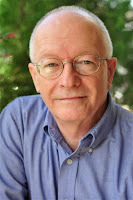 Henry’s debut novel, Journey to Riverbend, won the 2009 Operation First Novel contest.
Henry’s debut novel, Journey to Riverbend, won the 2009 Operation First Novel contest.Henry edits novels, leads critique groups, and teaches at conferences and workshops. He enjoys mentoring and coaching individual writers.
Connect with Henry on his BLOG, TWITTER and FACEBOOK.
Published on March 27, 2024 22:00
March 26, 2024
Writing the Perfect Flashback
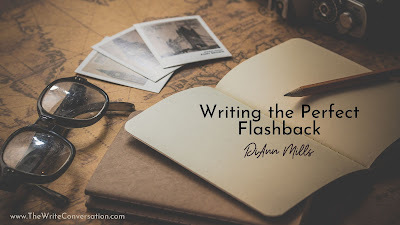
by DiAnn Mills @DiAnnMills
Flashbacks often have a bad reputation in the writing world. Writers hear warnings like, “Avoid a flashback like the plague.” I confess I’ve said that. But maybe I should have investigated further. Maybe I wasn’t fair to the purpose of this literary technique.
Let’s talk about definitions so we understand the meaning of a flashback.
Backstory is something remembered from the past that is critical to the goal of the scene. It is not a scene.
Prologue is an introduction to the story before chapter one line one. Often a prologue isn’t needed or can be chapter one.
Flashback is a scene that happens before the story opens. Before line one of the story, a flashback has occurred, and the writer deems it important for the character and the reader to revisit the event. The flashback can be a dream or a memory often triggered by an emotional event.
I want to show the advantages and disadvantages of using a flashback and how to write one effectively.
Tips When Writing a Flashback
Advantages of a FlashbackShows why a past event is essential to what’s occurring in the present—a connection point.Shows deeper motivation for the POV character(s).Shows how the present stress, tension, and conflict are more affected by the happenings in the past.Shows foreshadowing and symbolism with deeper insight.Shows how the character’s emotion in the past contributed to emotions in the present.Provides more information that contributes to the story’s content, pacing, and power.
Disadvantages of a FlashbackTosses the reader out of the story due to transporting them back in time. It’s a scene shift.Halts the forward momentum and can make the story confusing.Stops the present adventure and leaves the reader hanging.Weakens the story by providing unnecessary or too much information.Disables the reader’s experience by not allowing them to find out information on their own.Bores the reader.Length of flashback when backstory suits the purpose.
How to Write a FlashbackEstablish the necessity and purpose for the flashback.Choose the right scene to incorporate the flashback.Write in past perfect verb tense, but use “had” only once at the beginning of the scene.Abstain from using italics.Make the scene short and succinct.Use necessary emotion.Transition the chronological order. This can be accomplished by adding an extra space before and after the flashback. Some writers use a time element like, “Five years before.” Or “Now/Present.” The secret is clarity.Limit the number of flashbacks.Don’t introduce a flashback too early.Edit. Edit. Edit.
We’ve read amazing stories that use flashbacks successfully. I recommend reading the following for style and purpose. You can also watch the movies made from these highly acclaimed books.
Wuthering Heights – Emily BronteThe Great Gatsby – F. Scott FitzgeraldTo Kill a Mockingbird – Harper LeeThe Catcher in the Rye – J. D. SalingerThe Notebook – Nicholas SparksBridges Over Madison County – Robert James Waller Forrest Gump – Winston Groom
You be the judge if writing a flashback works for your story and the reader’s adventure.
TWEETABLEWriting the Perfect Flashback from author @DiAnnMills on @EdieMelson (Click to Tweet)
 DiAnn Mills is a bestselling author who believes her readers should expect an adventure. She creates action-packed, suspense-filled novels to thrill readers. Her titles have appeared on the CBA and ECPA bestseller lists; won two Christy Awards; and been finalists for the RITA, Daphne Du Maurier, Inspirational Readers’ Choice, and Carol award contests.
DiAnn Mills is a bestselling author who believes her readers should expect an adventure. She creates action-packed, suspense-filled novels to thrill readers. Her titles have appeared on the CBA and ECPA bestseller lists; won two Christy Awards; and been finalists for the RITA, Daphne Du Maurier, Inspirational Readers’ Choice, and Carol award contests. She is the former director of the Blue Ridge Mountain Christian Writers Conference, Mountainside Marketing Retreat, and Mountainside Novelist Retreat with social media specialist Edie Melson. Connect here: DiAnnMills.com
Published on March 26, 2024 22:00
March 25, 2024
Dipping the Quill Deeper: Another Story of Legacy
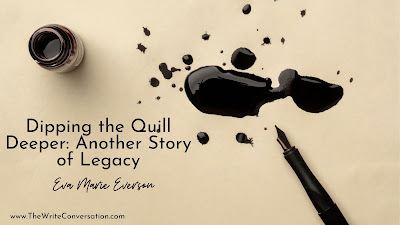
by Eva Marie Everson @EversonAuthor
I find the concept of legacy to be a fascinating one. I don’t think most of us intentionally set out to leave a legacy. I believe that, for the most part, the majority of us are just living our lives. We want to do well in our work, we want to do well by our families. But the days that follow the days slip up on us, often without a lot of thought when we are in the process of them. How often have I, now that I’m nearing my 8th decade, said, “Where did the years go?”
Even on a daily basis, I think, “Didn’t I just do this a minute ago?” when in actually, I did it a day ago.
This is part of the routine. Waking. Getting out of bed. Making coffee or tea. Making the bed. Working. Making more coffee or tea. Eating lunch. Eating dinner. Unmaking the bed. Going to sleep. Waking. Getting out of bed . . .
When the Gospel writers (or any of the writers of the Holy Writ) sat down with ink and parchment to pen their letters and stories, do you think that at any point they thought, “This is legacy in the making”?
I don’t. I think they were just penning stories for history’s sake and writing letters for the betterment of the church.
What about writers such as Melville, Shakespeare, Austin, the Bronte sisters, du Maurier, Dickens, Fitzgerald, Eliot, etc.? When they wrote their masterpieces, do you think that, at any time, they sat back and said, “This will be part of my legacy! I will be a legend because I wrote this!”?
I do not.
I think they just wrote whatever was in their heart and their mind.
Recently, I went to Cottonwood, Arizona for a Word Weavers all-day writing retreat. As per usual, I stayed at a member’s home. In this case, the home of a husband-and-wife writing duo. I couldn’t help but notice a large oil painting that hung behind the dining room table. This painting featured an older woman, sitting in a rocker beside an old farm table where a kerosene lamp gave off enough light for her to read the open Bible in her lap.
“That was my grandmother,” the wife told me.
I had flown in on Thursday and I didn’t leave until Monday. During those several days, I heard a lot about the grandmother. I also learned a lot about being raised on a sheep ranch in Montana. I learned that the grandmother moved to town and then, when her granddaughter (the wife) came to be a teenager, she moved in with her so that going to school was easier. If I remember correctly, from the ranch to the school was a thirty-mile trip and this had to be done twice a day.
“So my grandmother and I got very close in those years,” she told me.
For the longest time I stared at that painting. I also took a photo of it. And when I think about the beauty of the subject matter for longer than five seconds, I tear up.
I’ll bet this woman never wrote a book or even an article. I bet she never got up one morning and thought, “I wonder if anything I’ll ever do today or any day will leave a legacy.”
But she did, in fact, leave a remarkable legacy because 1) her granddaughter (and subsequently her great-grandchildren and great-great-grandchildren) will have her story and its influence; and 2) a woman from Florida spent several days studying the painting that bears witness to her love for God . . . and was moved.
And changed.
I have a feeling that, no matter how many books I write or speeches I give, none of that will matter if the everyday living of my life doesn’t point upward . . . if it doesn’t leave my children, my grandchildren, and so on with the desire to know Him more.
The challenge then is to put more effort into the one as I have done the other. And so, I shall. And so, shall I.
TWEETABLEDipping the Quill Deeper: Another Story of Legacy from @EversonAuthor on @EdieMelson (Click to Tweet)
 Eva Marie Everson is the CEO of Word Weavers International, the director of Florida Christian Writers Conference, and the contest director for Blue Ridge Mountains Christian Writers Conference. She is the multiple award-winning author of more than 45 books and countless articles and blogposts. She is also an award-winning speaker and a Bible teacher, a recipient of the Yvonne Lehman Award (2022), the AWSA Lifetime Achievement Award (2022), and the ECPA Gold Medallion (2023).
Eva Marie Everson is the CEO of Word Weavers International, the director of Florida Christian Writers Conference, and the contest director for Blue Ridge Mountains Christian Writers Conference. She is the multiple award-winning author of more than 45 books and countless articles and blogposts. She is also an award-winning speaker and a Bible teacher, a recipient of the Yvonne Lehman Award (2022), the AWSA Lifetime Achievement Award (2022), and the ECPA Gold Medallion (2023). Eva Marie is often seen at writers conferences across the States. She served as a mentor for the Jerry B. Jenkins Christian Writers Guild and taught as a guest professor at Taylor University in 2011. She and her husband make their home in Central Florida where they enjoy their grandchildren. They are owned by a cat named Vanessa.
Eva Marie's latest book, THE THIRD PATH JOURNAL, is a companion to her book, the AWSA Golden Scroll Book of the Year, THE THIRD PATH. The Third Path looks at 26 of the questions God asked in the Bible, then makes them personal to the reader. The premise of the book is currently her most asked for continuing workshop at writers conferences.
Published on March 25, 2024 22:00



